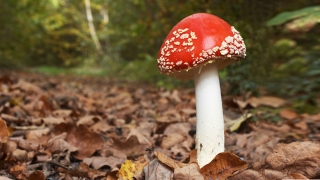Mushrooms
 A mushroom is a fungus that grows on wet, moist surfaces such as lawns, dead tree trunks, fences and wooded areas. There are about 5,000 different kinds of mushrooms in North America, but only eight types are considered poisonous.
A mushroom is a fungus that grows on wet, moist surfaces such as lawns, dead tree trunks, fences and wooded areas. There are about 5,000 different kinds of mushrooms in North America, but only eight types are considered poisonous.
Even though most mushrooms are edible, mushrooms that grow wild should never be eaten.
Poison control centers usually get two types of calls about mushroom ingestion/poisoning:
- A family member who is considered to be the "mushroom expert" picks wild mushrooms and prepares them as part of a meal for the family.
- A curious child picks wild mushrooms found in the backyard and eats them.
Symptoms of mushroom poisoning
Symptoms of mushroom poisoning range from upset stomach, drowsiness and confusion, to heart, liver and kidney damage. The symptoms may occur soon after eating a mushroom or can be delayed for 6-24 hours.
The most commonly ingested poisonous mushrooms are "gastrointestinal irritants." They are called "backyard mushrooms" or "field mushrooms." These mushrooms cause nausea, vomiting, diarrhea and stomach pain. The symptoms can start 30 minutes to three hours after they are eaten and symptoms usually stop in one or two days.
The majority of deaths from poisonous mushrooms are caused by Amanitas or "death caps." Death caps are not unique in appearance and can easily be mistaken for nonpoisonous species. They do not have a distinct taste or smell, and the toxin is not destroyed by cooking.
Symptoms from eating death caps are typically delayed for 6-24 hours. At first you may experience severe stomach pain, vomiting and diarrhea. A few days later symptoms can progress to blood disorders, seizures, and liver and kidney damage.
Treatment for mushroom poisoning
The close physical similarities of many mushrooms make it difficult for anyone but a trained expert (mycologist) to differentiate them. To make matters worse, most poisonous mushrooms resemble edible mushrooms at some phase of their growth. So, the best prevention against mushroom poisonings is to assume that NO wild mushrooms are safe to eat.
Call the Poison Control Center at 1-800-222-1222 for guidance on what to do. It is important that you call as soon after the ingestion as possible.
Refrigerate the uneaten portion of the mushroom in a bag clearly marked "poison" in case later identification will be needed. If delayed symptoms do occur (6-24 hours after ingestion), your child will have to be seen in the emergency department.

